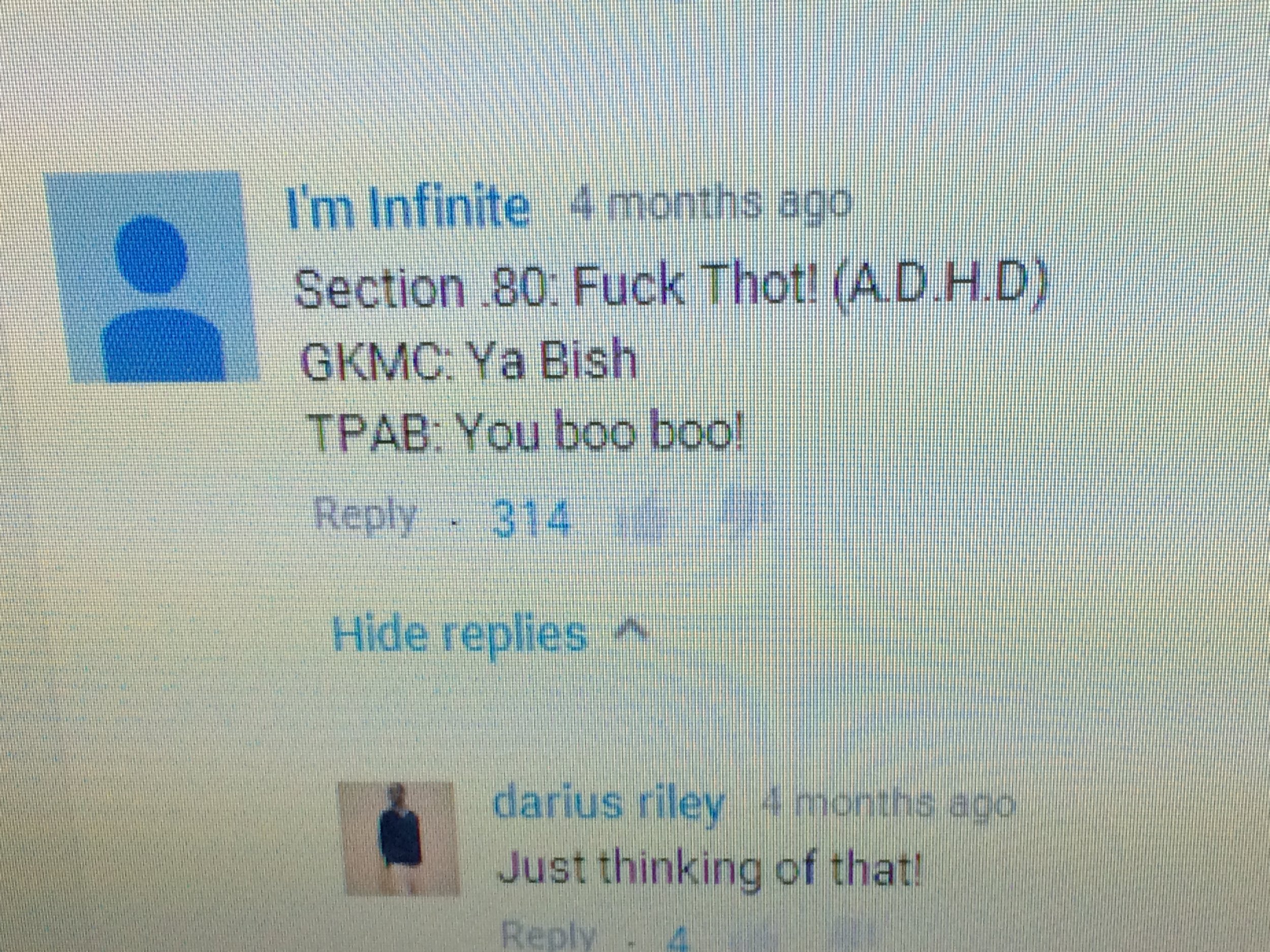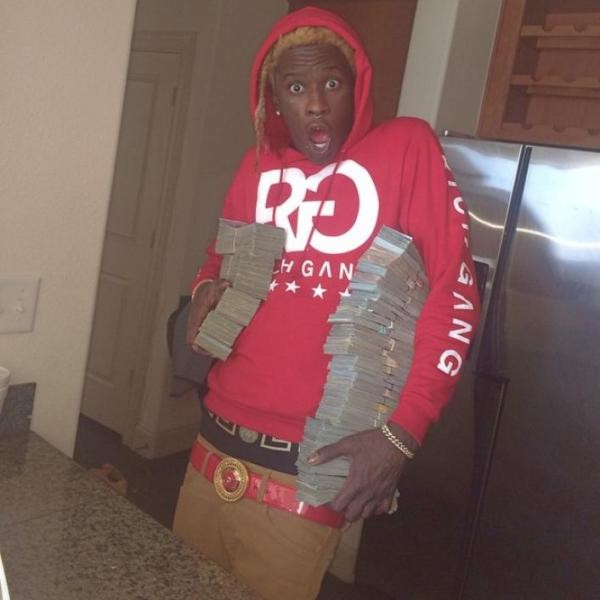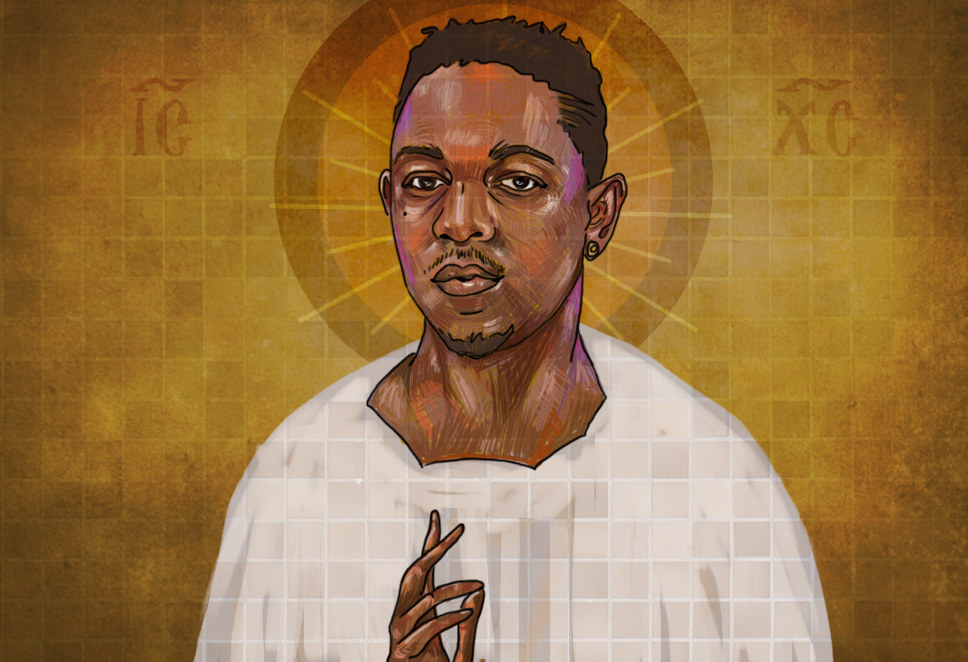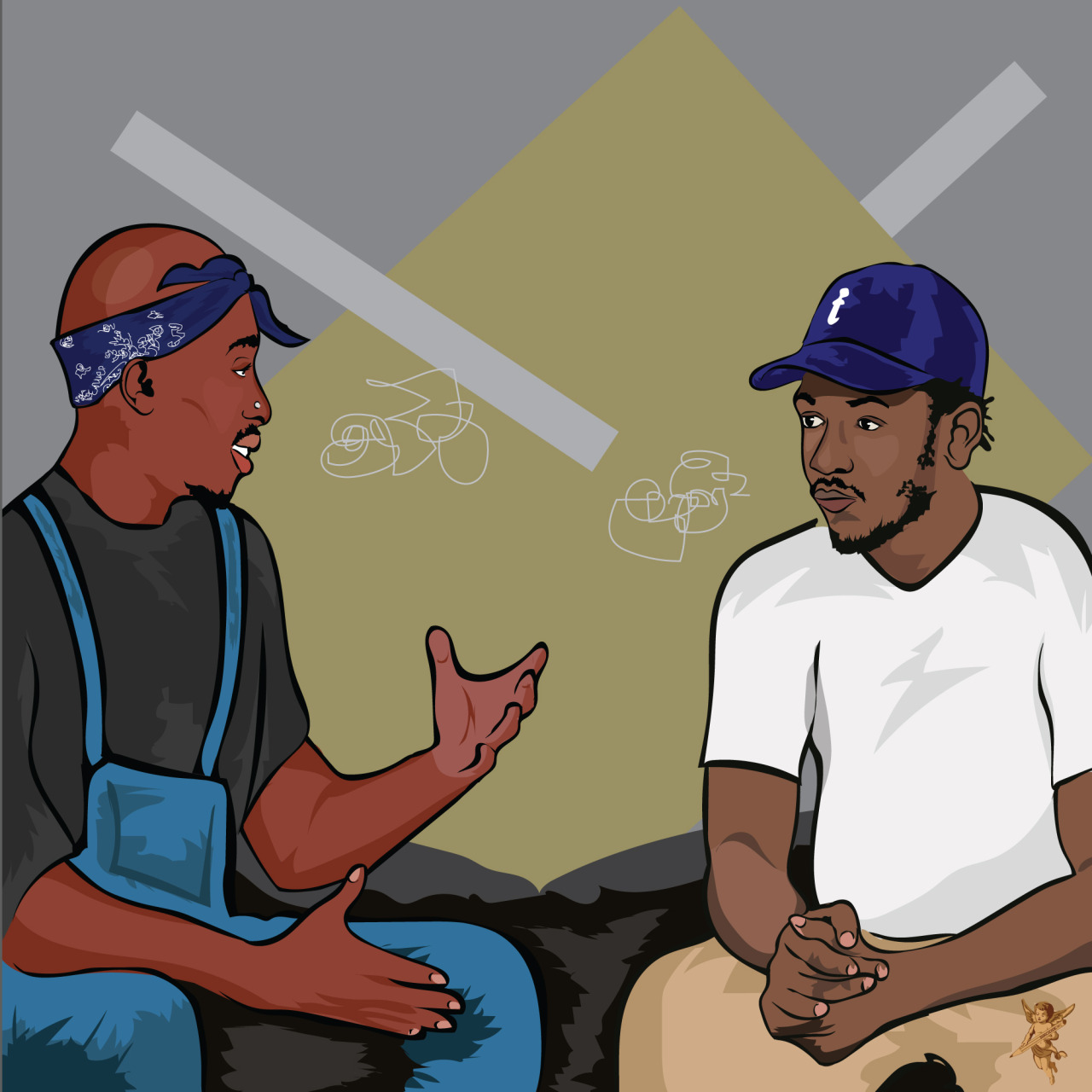To Pimp A Butterfly: A Track by Track Review Part 2
 Release Date: March 15, 2015
Rating: 10/10
Release Date: March 15, 2015
Rating: 10/10
Favorite Tracks: For Free?, Institutionalized, U, Alright, Hood Politics
Introduction
To Pimp A Butterfly thus far has provided us with an emotionally driven work that details the struggles brought forth by Kendrick Lamar’s newly gained success. Thematically, tracks 1-8 range from personal issues that Lamar bottles up to business/celebrity temptations lured by corporate America/popular culture. Kendrick’s talks, in between some songs, has smoothly guided the listener to a larger context, therefore confirming that this album, like Good Kid Maad City, contains a narrative. The narrative is based on some sort of poem (Kendrick's talks)that is broken up in between the songs and exposed more and more as the album progresses, a concept I’ve never seen done before.
Picking up right where we left off, Kendrick overcomes obstacles brought forth by success and his own depression, but he is still searching for some clarity after being seduced by “Lucy” yet again. That’s when he decides to “go back home”.
9. Momma
 This instrumental perfectly embodies the title. It provides Lamar with, what I would best describe as, a nurturing feeling. The soothing vocals are sampled from singer/songwriter Lalah Hathaway’s “On Your Own”. Interestingly enough, Terrace Martin is listed as a producer for the album where this single was released. Also, drummer Robert Sput Searlight, who has appeared on some songs in this album, assisted Hathaway on her Grammy win for the song Something.Like many songs on the album, Momma could be interpreted in many different ways. 1. The song could be about going to Africa and urging black people to get in-touch with their ancestral history.
This instrumental perfectly embodies the title. It provides Lamar with, what I would best describe as, a nurturing feeling. The soothing vocals are sampled from singer/songwriter Lalah Hathaway’s “On Your Own”. Interestingly enough, Terrace Martin is listed as a producer for the album where this single was released. Also, drummer Robert Sput Searlight, who has appeared on some songs in this album, assisted Hathaway on her Grammy win for the song Something.Like many songs on the album, Momma could be interpreted in many different ways. 1. The song could be about going to Africa and urging black people to get in-touch with their ancestral history.
 Kendrick himself visited South Africa recently and says it was a imperative visit. 2. It could also be about escaping the stressful aspects of success and going back to your hometown. 3. Lastly, this song could also be about draining yourself of negativity and reaching a place of sanity and internal clarity, especially through religion.
Kendrick himself visited South Africa recently and says it was a imperative visit. 2. It could also be about escaping the stressful aspects of success and going back to your hometown. 3. Lastly, this song could also be about draining yourself of negativity and reaching a place of sanity and internal clarity, especially through religion.
We’ve been waiting for you. Waiting for you. Waiting for you. Waiting for...you.
First Verse: Kendrick details his early beginnings in rapping. He talks about getting better over the years by not “mimicking radio nemesis” and now reaching a status that gives him a “feeling that is unmatched”, thanks to his early years in Compton.
Thank God for rap, I would say it got me a plaque But what’s better than that? The fact that it brought me back home.
Second verse: In true Socratic fashion, Kendrick embodies the famous quote: “I know one thing: that I know nothing.” He spends the entire verse talking about how he “knows everything”, listing many aspects of life from spirituality to "advertisements and sponsors". He, however, ends the verse saying
I know what I know and I know it well not to forget. Until I realized I didn’t know shit. The say I came home
Third Verse: Kendrick meets a young boy that resembles him. Out of all people, this young child enlightens Lamar by telling him to be embrace his upbringings, be an advocate for his community, and telling his “homies to come back home”.
The beat suddenly changes to a more upbeat sounding instrumental. The music along with Kendrick’s rapping/singing makes this one of my favorite parts of the album because of its liveliness. This part of the song seems genreless to my ears. The closest genre I would label it as would probably be jazz-rap because of the saxophone being such an integral component in the song. Kendrick elaborates more on “this feeling” in this section of the song with lines like “Where you [the feeling] reside? Is it in a woman, is it in money, or mankind” and also…
I thought I found you back in the ghetto when I was 17 with a 38 special. Maybe you’re in a dollar bill maybe youre not real. Maybe the wealthy get to know how you feel...
This section of the song can be found in the SNL performance of his first single “i”, a performance, and single brought forth months before the album was released. Fast Forward to 4:09.
[youtube https://www.youtube.com/watch?v=sop2V_MREEI&w=560&h=315]
Intertwining Tracks:
| Wesley’s Theory: | 1. The chorus 2 of Wesley's Theory ("Go back home. money go back home") applies to this song.
2. “Gambling Benjamin benefits sinning in traffic. Spinning women on cartwheels, lien fabric on fashion” |
| Institutionalized: | 1.“My innocence limited the experiences lacked”
2. “I know street shit. I know shit that’s conscious” |
| U: | “I know fatality might haunt you” |
| Aright: | “Where u reside? Is it in a woman? is it in money? or mankind?” The same questions he asks in Alright. |
| For sale?: | “I know loyalty I know respect I know those that’s ornery” what Lucy wants and claims she isn’t in the previous song.” |
10. Hood Politics
Kendrick goes back to his braggadocios ways, this time the bashful content being the overall message of the song. However, he puts up this cocky wall to reassure himself that he has always been THAT guy, that he has always been “A1”. Because of its themes and execution of delivery via lyrics, this song does a great job of embodying the stereotypical hip hop essence of cockiness, i.e. your typical brag-rap song.
I’ve been A1 since day 1, you niggas boo boo.
The captivating saying in the song Cut You Off, from Kendrick’s first project Overly Dedicated, is present here. As Youtuber “I’m Infinite” would say:
Another commenter also suggested “Don’t wowwy” for Overly Dedicated.
In Hood Politics, Lamar delivers one of his most mesmerizing displays of lyricism on the album. He succeeds in giving many quotable bars to his fans. I’ve seen many people often quote several lines in this song before I’ve even listened to the album.
Lines like “Aint nothing new but a flu of new Democrips and Rebloodicans. Red state vs a Blue State which one you governing?”standout completely. This line also has a great message, basically saying that the hood mentality, like in Institutionalized, applies to everyone.
Another interesting point was when Lamar also touched on the control verse fiasco in 2013. Considering how humble he was about the criticism he received, it’s a breath of fresh air to see him take the presumptuous approach and say:
Unless you askin me about power. Yeah I got a lot of it. I’m the only nigga next to Snoop that could push the button. Had the coast on stand by...
Further establishing his “power” he confidently ends the verse saying:
But I resolved inside that private hall sitting there with Jay. He said it’s funny how one verse could fuck up the game. I’ve been A1 since Day 1, you niggas boo boo.
I remembered you was conflicted misusing your influence, sometimes I did the same. Abusing my power full of resentment. Resentment that turned into a deep depression. I found myself screamin' in the hotel room. I didn't wanna self destruct, the evils of Lucy was all around me. So I went runnin' for answers. Until I came home. But that didn’t stop survivor’s guilt, going back and forth trying to convince myself of the stripes I’ve earned Or maybe how A1 my foundations was. But while my loved ones was fighting a continues war back in the city, I was entering a new one.
Intertwining Tracks:
| Wesley Theory, King Kunta: | “Democrips and Rebloodicans” the mixing of the hood and politics again, hence the title of the song |
| King Kunta: | 1. These two songs are the braggadocios songs of the album
2. "24/7 365 days times two, i was contemplating gettin on stage just to go back to my hood hear my enemy and say...". Pretty much the premise of Hood Politics. |
| Momma: | In verse 1 of both songs Kendrick talks about his early rapping days and how he is now a big star. |
11. How Much A Dollar Cost
This one of the most standout tracks of the album, produced by one the most standout producers on the album. Under the name LoveDragon, many have wondered about his/her identity. Many have spread rumors but no one is quite sure yet. Kendrick reveals that the producer wants to keep his/her identity a secret so no one will know for a while.
How Much a Dollar Cost speaks like a passage from the bible. Coincidently the sounds of the song from, the vocals to the piano, wrap the song’s omniscient presence in mysticism. Kendrick begins the track feeling perplexed and bothered, questioning the value of money. He then starts the parable with a homeless man at a gas station in South Africa begging him for 10 Rand (1 US dollar) as Kendrick tells him to leave, assuming he will use the money for drugs.
Funnily enough, Kendrick could’ve ended it all by simply driving away from the man in the 2nd verse but he’s hesitant to leave with the line “he’s staring at me“showing up often. In the last verse Kendrick details a dialogue with the man, continuing with Kendrick’s stinginess and the homeless man’s humbleness. As the homeless man, Lamar brilliantly references Exodus 14 when trying to show Kendrick that even a timid man could guide people to the promise land. The man eventually reveals to be God providing Kendrick, with a long awaiting answer:
 I’ll tell you how much a dollar cost.
The price of having a spot I Heaven, embrace your loss, I am God.
I’ll tell you how much a dollar cost.
The price of having a spot I Heaven, embrace your loss, I am God.
A troubled Kendrick, played by the legendary singer/songwriter Ron Isley, closes the song with the similar theme in Aright (hoping things will get better through God). Although listed as a feature, Isley is only equipped with a couple of lines to sing. One would think he would be used more (maybe in a chorus, considering that there was no chorus to this song). However, this small snippet was well executed enough to leave a great mark on an unforgettable song.
Check out Kendrick explaining this song on 6:01.
[youtube https://www.youtube.com/watch?v=Hu4Pz9PjolI&w=560&h=315]
| Wesley’s Theory, For Sale?: | “My son temptation is one thing I defeated”. Kendrick was also being tempted by the evils in these songs. |
| Wesley’s Theory: | The “I can see the borrow in you I can see the dollar in you” line from Wesley’s Theory is the same premise of How Much A Dollar Cost. |
| Institutionalized: | The dazedness and the”what money got to do with it” line in the introduction of Institutionalized are similar to first few lines in this song. |
| U: | The start of third verse, ending in “who the fuck am I kidding”, could modulate over to U, as they both share that same theme (some of the words, like guilt and selfishness, Kendrick actually uses in U) |
| Alright: | Both songs use the phrase “rights my wrongs” |
12. COMPLEXION ( A ZULU LOVE
With the appreciation of black physical features in the U.S., and the rest of the world, being scarce, Lamar proposes Complexion: A song unifying people of the world by stating “complexion don’t mean a thing”.
Dark as the midnight hour or bright as the morning sun, give a fuck about your complexion, I know what the Germans have done.
In several lines of the song, Kendrick plays the character of a slave trying to woo a black woman in the plantation house. Considering that field slaves were darker than anyone in the house, Lamar was trying to metaphorically bridge the two worlds. He states how ignorant he used to be when discriminating against a woman’s skin complexion (he doesn’t specify what type of skin tone) and then shouts-out his recently-engaged lover Whitney Alford, who told him “a woman is a woman, love the creation.”
A minor beat change occurs and Lamar passes the mic to North Carolina Fem-c, Rapsody. The gif below successfully sums up Rapsody’s verse in nutshell.
It was that good.
There were so many quotables in this song from “Enforcing my dark side like a young George Lucas. Light don’t mean you smart being dark don’t make you stupid” or “Call your brothers magnificent, call all your sisters Queens. We all on the same team, blues and pirus no colors mean a thing.” The metaphors were impeccable, references were brilliant and a breath of fresh air, and her flow was great. Perfect way to end the song.
Intertwining Tracks:
N/A
13. The Blacker the Berry
“I wish somebody would look in our neighborhood knowing that its already a situation, mentally, where its fucked up. What happened should’ve never happened. Never. But when we don’t have respect for ourselves, how do we expect them to respect us? It starts from within. Don’t start with just a rally, don’t start from looting, it starts from within”.
These words, derived from Kendrick Lamar, have stirred much controversy when published from a billboard magazine interview earlier this year. As race relations continue to be a growing problem in the U.S., Lamar adds his two cents on the single The Blacker the Berry.
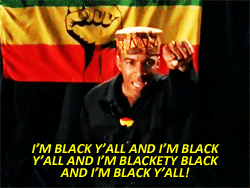 The song circles around a pro-black narrator that states his love for black features and culture and angrily denounces white America, claiming that they “never liked us anyway”.
The song circles around a pro-black narrator that states his love for black features and culture and angrily denounces white America, claiming that they “never liked us anyway”.
Lamar started each verse with “I’m the biggest hypocrite of 2015” a line temporarily used to derail the listener by taking them on a misguided ride full of resentment and finger-pointing. Lamar then takes the plot twist-approach of throwing the entire song out of context with the last line:
So why did I weep when Trayvon Martin was in the street? when gang bangin in make me kill a nigga blacker than me? Hypocrite!
Lamar warns that the uplifting of self is a must before trying to take on your oppressors; hence, the double entendre in the title. The double sidedness of the title refers to 1. the popular saying “the blacker the berry the sweeter the juice” and 2. the juice referring to power and abuse (made famous in the movie Juice). One of them is accepting of black people the other is sabotaging black people. Interestingly enough, both terms are connected to Tupac in some way. Lamar has responded to the criticism of this track by saying he was talking to himself, instead of the black community, like many believed he was doing.
Tune in at 1:58 to hear Lamar’s thoughts
[youtube https://www.youtube.com/watch?v=BwXlimryKJM&w=560&h=315]
The Blacker the Berry’s delivery was the angriest on the album. It is the only track that had that level of aggression and is one of the rare tracks that has a boom-bap percussiveness to it. The grim instrumental was primarily created by Boi-1da. Along with Kendrick’s resentful tone, the haunting piano chords and eerie guitar sounds flawlessly add on to the intensity of the track.
The haunting vibe is made more apparent when the piano is the only instrument being played, as showed:
[youtube https://www.youtube.com/watch?v=m2W4olZZZFw&w=560&h=315]
Intertwining tracks:
| King Kunta: | 1. The pro-black themes are present in both songs.
2. The desire to degrade black culture ("cut the leg off him") is also present in both songs. |
| Institutionalized: | “Church me with your fake prophesizing that imma be just another slave I my head. Institutionalized…” |
| Complexion (A Zulu Love): | 1. Both songs deal with admiration of black skin/people.
2. “Blues and pirus no colors mean a thing” Rapsody ends Complexion with a superb transition into Blacker the Berry because of the themes of inner-hate perpetuated by gang violence. 3.”Im black as the heart of a fucking Aryan” similar to the “I know what the Germans have done” line in Complexion. |
15. You Aint Gotta Lie (Momma Said)
Pushing towards the end of the album, You Aint Gotta Lie takes the Real spot in GKMC. Like Real, an important aspect of this song is Kendrick’s mother. Her words make up the blueprint of this song. In true waterboy fashion, Kendrick says in the intro:
Hey, hey, babe check it out, Imma tell you what my mama had said, she like…
Lamar’s mother says his level of “realness” is now reduced because of his celebrity status. He comes back home and his mom immediately catches him on his BS.
The pre chorus goes from: “Askin where the hoes at to impress me. Askin where the moneybags to impress me. Say you got the burner stashed to impress me. It’s all in your head homie...”
to the eventual chorus: “you aint gotta lie to kick it ma nigga. You aint gotta lie, you aint gotta lie. You aint gotta lie to kick it, ma nigga. You aint gotta try so hard.”
This song later translates to people other than Kendrick (a technique used often in this album) especially the money flashy rappers.
Lamar basically says you don’t have to sell lies to the public. The most common lies in the rap industry today range from money to women to drugs to violence. He hits us with a very memorable line:
See, loud rich niggas got low money.And loud broke niggas got no money.The irony behind it is so funny
Produced by LoveDragon, this song demonstrates a lighthearted vibe. The synthesizers and the talk box enhance that vibe, as well as placing the California/west coast stamp on the track. Kendrick mostly spits in the high pitch/Andre 300 voice, and flow, that he does so often, especially at the end.
Intertwining Tracks:
| Wesley’s Theory ,King Kunta, Hood Politics | “You sound like the feds homie” before this line there was a mentioning of hood related topics Kendrick tries to emulate. A mixing of the hood and politics yet again. |
| Hood Politics | 1. This song seems like his mother’s response to this record, and in essence his own response.
2. Niggas be fugazi biches be fugazi…” same as the chorus on Hood Politics |
| Momma | “Been a virgin to bullshit” = “The perks of bullshit isn’t meant for me” |
15. i
[youtube https://www.youtube.com/watch?v=8aShfolR6w8&w=560&h=315]
When a song is as successful as i, changing the song in any way would be considered a risky move. Singer/Songwriter Taylor Swift, on the other hand, released a video for her single Bad Blood with an unexpected verse from Lamar. It worked well in her favor. Lamar does the same concept but in a slightly different way.
On the album, Lamar presents us with a complete alternate version of i, a live version. The same speaker used in the beginning of the music video introduces Kendrick to his hometown, Compton.
The concept of having love for yourself is scarce on the radio, or music in general; it is especially almost non-existent in rap music. Serving as the counter opposite of u, i tells a tale of overcoming depression. Contrary to the common misconception, u was recorded first, meaning i was the response to u. Kendrick was at a point where he felt better in life and wanted to give that same message to incarcerated prisoners and people who are suicidal.
The delivery in this song is a huge contrast to the single version. Instead of the high pitch Kendrick voice, Lamar exercises his usual performance self over the Isley Brothers’ sample of Who’s that Lady. This version is strikingly similar to the SNL performance mentioned before in Momma.
[youtube https://www.youtube.com/watch?v=sop2V_MREEI&w=560&h=315]
Lamar’s last verse however is interrupted by a fight involving his friends in the audience, one of the great moments in this album. Lamar tells them “how many niggas we don lost bro?”, among many persuading lines, and starts to spit a freestyle. Lamar goes back to the Boris Gardner sample on Wesley’s Theory as he tries to justify the use of the infamous n-word to the audience. He educates the audience, and listeners, on the origins of the word; making us wonder whether the negative connotation and backlash of the word was yet another form of oppression.
Listen to Dr. Kaba Hiawatha Kamene detail the origins of the word negus.
[youtube https://www.youtube.com/watch?v=zZwp9Sz-ePU&w=560&h=315]
Intertwining tracks:
| Wesley’s Theory | The n-word justification in both songs. |
| King Kunta | “So many mothafuckas wanna down me” = “everybody wanna cut the legs off him” |
| These Walls | “The judge make time” like in the last verse of These Walls |
| u | 1. The depression in i is what's spoken about in u.
2. “Trials and tribulations” are mentioned in both songs. 3.”In front of a double dirty mirror they found me” the same mirrors he talked about at the end of u. |
| Alright | 1. Both songs share the same concept of fighting depression based off of u
2.”These days of frustration keep ya on tuck and rotation” = “painkillers only put me in a twilight” |
| Hood Politics | “I went to war last night” the same concept of “going to war” is mentioned at the end of the poem section in Hood Politics. |
16. Moral Man
Many people have compared the Compton MC to legendary West Coast rapper Tupac Shakur. Aside from the Pac flows and messages used in other tracks on this album, this song truly embodies this comparison.
Kendrick questions:
When shit hit the fan, is u still a fan?
In typical Tupac fashion, Lamar denounces the evils of fame. He fears his image will be damaged because of his uplifting messages of social consciousness. He states Michael Jackson, JFK, and Moses as some examples.
 It’s interesting how he keeps mentioning Nelson Mandela’s name in an admiring way. He often says “I want you to love me like Nelson” and he also mentions how he visited his cell in Robben’s Island. This is interesting considering that during his stay in South Africa he got most of his inspiration for this album.
It’s interesting how he keeps mentioning Nelson Mandela’s name in an admiring way. He often says “I want you to love me like Nelson” and he also mentions how he visited his cell in Robben’s Island. This is interesting considering that during his stay in South Africa he got most of his inspiration for this album.
After providing us with a number of conscious messages, Mortal Man does a great job in closing the album by asking his fans will they still believe in him. In the second verse Lamar plays the relatability card once again as he places himself in everyone else’s perspective and says people go through the same struggle; i.e. close friends abandoning you during the rough patches of your life.
Through it all, Lamar hopes for his words and legacy as a positive leader continue to live on forever as he progresses in his career as the “leader of the new school”.
Intertwining Tracks:
| These Walls | “You think she’s gonna stick around when them 25 yrs occur” lack of commitment to someone behind bars like in the second verse of These Walls. |
| For Sale? | From the lines “like who got your best interest” to “and who pretending?” epitomize Lucy in For Sale? |
| Momma | “See I gotta question it all family friends, fans, cats dogs…” Similar to the second verse in Momma. |
| You Aint Gotta Lie | The line “and the girls gon neglect you once your parody is gone…” can apply to Mortal Man as well. |
Outro:
I remembered you was conflicted misusing your influence, sometimes I did the same. Abusing my power full of resentment, resentment that turned into a deep depression. I found myself screamin' in the hotel room. I didn't wanna self destruct, the evils of Lucy was all around me. So I went runnin' for answers. Until I came home. But that didn’t stop the survivor’s guilt, going back and forth trying to convince myself of the stripes I’ve earned or maybe how A1 my foundations was. But while my loved ones was fighting a continues war back in the city I was entering a new one. A war that was based on apartheid and discrimination. Made me wanna go back to the city and tell the homies what I learned. The word was respect. Just because you wore a different gang color that mines doesn’t mean I can’t respect you as a black man. Forgetting all the pain and hurt we caused each other in these streets, if I respect you we unify and stop the enemy from killing us. But I don’t know, im no mortal man, maybe im just another nigga.
We finally get to the conclusion of the structural poem. Unlike GKMC which has a plot-based narrative, TPAB follows a groundbreaking concept of a narrative based on a poem. The finishing pieces of the poem completes the narrative but finishes unresolved, as the narrator at the end still questions/doubts himself (could also be praising himself considering that nigga [negus] is originally defined as an emperor/god, i.e. no mortal man).
The outro and album then take a turn as we learn this whole time Lamar was talking to a man who has undoubtedly solidified his legacy. Mr. Immortal Man himself, Tupac Shakur.
Lamar proceeds with an interview of Pac where the questions vary from black resistance to spirituality.
In typical prophetic Pac fashion he talks about things that are relevant today, long after his death. He also mentioned some themes in this album. In his closing statement, for instance, Tupac says “we aint even really rappin, we just lettin our dead homies tell stories for us” (Similar to what Kendrick says about Nelson Mandela's spirit in Mortal Man).
Kendrick then recites a poem that, in essence, explains the entire album. He waits for an answer from Pac but he doesn’t get one. Lamar basically is trying to insinuate to the listener that the “dead homies” are living within him and that the answers he is looking for is inside him, and were inside him the entire time.
Conclusion
Reviewer Kinge from the Youtube channel Dead End Hip Hop said “You know one of the things that I love about it [TPAB], is that its.. its.. so black”. I couldn’t agree more. To Pimp A Butterfly is encompassed by black styled genres such as Jazz, Funk, Soul, Hip Hop, and some might argue spoken word. Because of this genre meshing and various experimental approaches in sounds, this album became one of the most exciting and exceptional pieces of work i've ever had the pleasure of listening to in my life, let alone in recent years.
Lamar’s delivery in each song was stupendous. He has gotten better with finding the perfect flow/tone for each beat every time he releases a new project. With each character Kendrick introduces he brings that character to life with his voice. It feels like he has truly mastered that in this project. Also, Kendrick grows more into a socially aware rapper this time around by analyzing society and himself in depth, showing that society as a whole (Kendrick included) needs to improve. He also grows more into a politically aware rapper, always associating the government with a corrupt act (the mixing of the hood and politics which we saw so often).
Although not as conclusive and happy ending-based as GKMC, TPAB still does well in supplying us with an ending. Its more realistic to think even though we will technically never have the answers, preparing decent goals, in striving for perfection, will get us far.
In Conclusion, sonically, lyrically, and message wise, it was a great album; without a doubt, Lamar's best work to date. I truly believe we’ll be looking back at this album and calling it a turning point and a stand-outish piece of work in music. There goes yet another classic for Mr. Kendrick Lamar. Well done.


